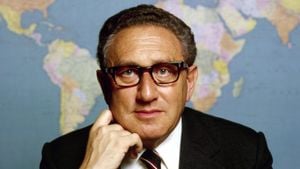The conflict between Israel and Gaza has escalated to alarming levels recently, bringing renewed focus to the region and adding layers of complexity to long-standing tensions. This situation has drawn global attention, with leaders from various nations weighing in on the crisis, actively discussing possible interventions and responses amid growing fears of widespread instability.
On one side, Israeli Prime Minister Benjamin Netanyahu has made grave threats about the potential long-term consequences of the regional turmoil, hinting at the calamity similar to what’s currently observed in Gaza. He stated, “we are entering the second phase of our campaign,” emphasizing the severity of military operations being undertaken. His administration has reportedly signaled intentions to expand operations beyond Gaza’s borders, particularly targeting Hezbollah positions across the Lebanese border.
The Israeli government has ramped up military operations, resulting in staggering casualties. Figures indicate over 42,000 fatalities, along with millions of displaced Palestinians within Gaza alone, attributable largely to extensive airstrikes targeting civilian infrastructure, including hospitals and schools. Such actions seem to reflect Netanyahu's approach of eradicative strikes, positioning the conflict with hardly any prospect of resolution.
Meanwhile, the situation has drawn sharp criticism from the Palestinian side, which has labeled the assaults as genocidal. Some organizations and political leaders have rallied behind the resistance forces, calling for solidarity with the Palestinian cause and condemning what they characterize as imperialist complicity under the auspices of U.S. support.
Indeed, the role of the United States looms large. President Joe Biden and Netanyahu spoke for the first time in months recently, amid heightened tensions due to missile attacks originating from Iran. Biden’s administration supports Israel's right to defend itself but faces scrutiny for arms supplied to Israel, which critics claim facilitate the violence against Palestinian civilians. Despite the administration's efforts to exert some control over Israeli military responses, reports suggest Biden is up against deep-seated challenges, not least because of Netanyahu's firm stance on military strategy.
White House Press Secretary Karine Jean-Pierre described the recent phone call as “productive”, where the discussion centered on how Israel might retaliate to Iranian provocations, with Biden advocating for focused targeting to minimize collateral damage. Netanyahu has publicly committed to responding decisively to Iranian attacks, indicating more than mere rhetoric. “They will not understand what happened and how,” Israeli Defense Minister Yoav Gallant warned, underlining the presumed intensity of any forthcoming actions.
Despite increasing diplomatic efforts, the Biden administration appears to be facing futility concerning its diplomatic maneuvers, as evidenced by Netanyahu’s tactical postponement of meetings with U.S. defense officials. Such actions have fueled speculation about internal Israeli politics, particularly as the October 7 attacks by Hamas still reverberate throughout the region.
On the international stage, differences among political actors run deep. Most Arab states have recently taken steps toward normalizing ties with Israel, creating potential fissures within the Palestinian solidarity movement. For example, the so-called Abraham Accords facilitated increased cooperation between Israel and several Arab nations, but these developments raised eyebrows across various factions, inciting criticism from those asserting Palestine's claims to statehood and dignity. The discord raises relevant questions about unity—chiefly whether consolidative action among Arab leaders might stand to benefit the beleaguered Palestinian population.
Conditions on the ground have fueled extreme reactions and calls for rebellion, with calls to action reverberated among leftist factions within the ranks of Palestinian nationalist organizations. There is growing agitation among activists promoting solidarity with Palestine, decrying the policies of both the Israeli government and those financing its military activities. Political statements reject notions of neutrality, supporting armed resistance and highlighting atrocities faced by civilians caught up in crossfire.
The repercussions of such conflicts extend beyond immediate clashes; they resonate through economic, cultural, and social landscapes. Increasing military budgets among world powers hint at broader geopolitical ambitions even amid struggles for public sentiment and electoral outcomes, especially as each side embarks on strategic alliances.
Within this maelstrom, grassroots movements have gained momentum, with demonstrations occurring worldwide advocating for Palestine. Activists increasingly call for economic sanctions against Israel, refusing to lend support to businesses and institutions perceived as perpetuating oppression.
What's crystal clear is the ever-complex and turbulent nature of the Israeli-Palestinian conflict as engaging perspectives and staunch opposition proliferate globally. The narrative continues to evolve; sharp and poignant realities play out on the ground every day, encompassing lives, cultures, and histories woven long before current tensions emerged. Each development fuels shifts within international dialogues, humanitarian appeals, and critiques demanding justice, equity, and peace.
At its core, the struggle reflects the deep historical narratives and existential dilemmas tied to identity, sovereignty, and human rights, laying bare the conflict's fundamental challenges. It remains to be seen how indigenous and international voices may find pathways concerted toward resolution amid the cacophony of debates and divisions.
This developing situation encapsulates the pressing need for renewed dialogue paired with actionable resolutions. Fostering reconciliation stands not merely as hopeful rhetoric but demands firm commitments to alleviate human suffering and pave the way for sustainable peace.



